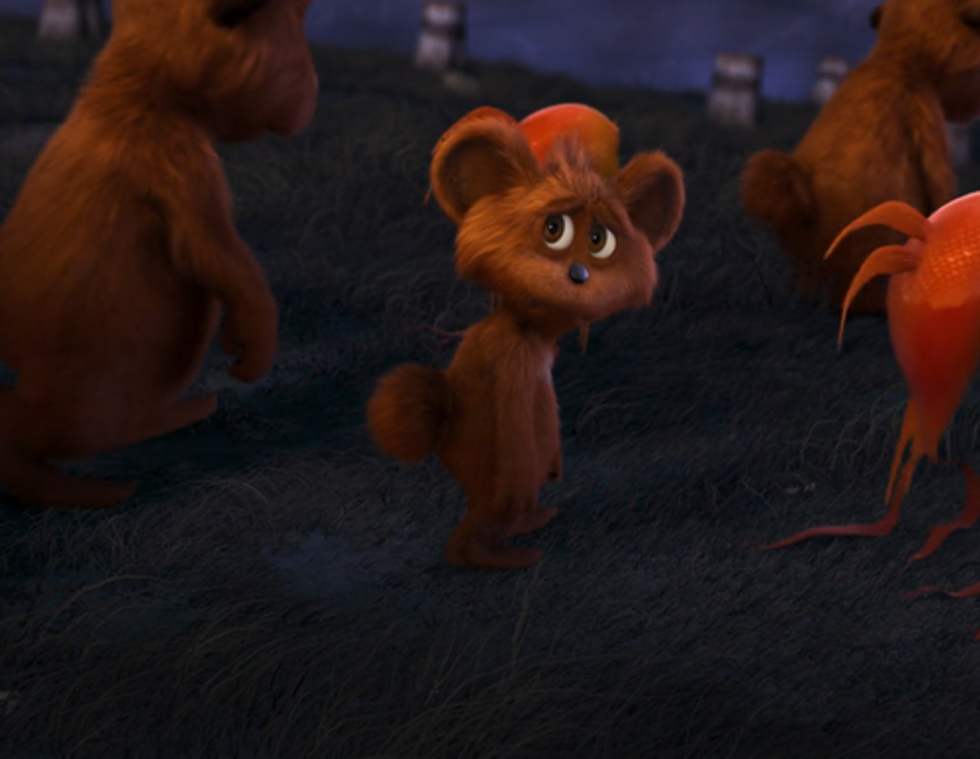If you've ever read or watched The Lorax (old or new movie), you know how the story goes. The Once-ler is an ambitious and creative genius who is eager to prove himself. He comes across Truffula Trees, which have the softest tufts. The Once-ler seizes the opportunity: he cuts down a Truffula Tree and knits a Thneed, which, according to the Once-ler, is "A-fine-something-that-all-people-need." The Lorax comes in and warns the Once-ler, but the Once-ler doesn't listen because Thneeds are a total hit. Soon, the Once-ler is chopping down Truffula Trees quicker than ever before to meet the market's demand for these Thneeds.
As a result, the adorable Bar-ba-loots, Humming Fish, and Swomee-Swans can no longer live in the Truffula Tree forest that they once thrived in because of the deforestation and toxic waste that mass Thneed production was causing. You get the picture:

Many people (myself included) are quick to point fingers at large conglomerates and multinational companies for causing the majority of our environment's problems. And I don't believe that we're wrong in doing that. It seems as though every day, there is a new endangered species, temperature increase, and/or subsequent concerning rise in water levels. Clearly, someone is doing something wrong.
But honestly, we (yes, you and I) aren't blameless.
These corporations feel compelled to continue manufacturing and producing things because we demand it. This brings me to another quote from The Lorax:
"I meant no harm. I most truly did not. But I had to grow bigger. So bigger I got. I biggered my factory. I biggered my roads. I biggered my wagons. I biggered the loads of the Thneeds I shipped out. I was shipping them forth to the South! To the East! To the West! To the North! I went right on biggering...selling more Thneeds. And I biggered my money, which everyone needs." -Dr. Seuss
The Once-ler would not have had to "bigger" his business if nobody bothered with his Thneeds. The Lorax tried to get him to listen to reason, but The Once-ler could not be convinced because he saw with his own eyes the orders that came in for Thneeds, and his ignorance combined with the ineffective tactics used by the Lorax lead to the forest becoming inhabitable. Unlike the fictional world where the Lorax and the Once-ler resided, we, the consumers of planet Earth, still have a chance to make a difference by reducing demand for products that are main culprits of climate change.

So what does any of this have to do with how we, as broke financially challenged college students, can help save the Earth? I have two words for you: Meatless Mondays.
The basis of Meatless Mondays is exactly what it sounds like: you don't eat meat on Mondays. Or if Mondays don't work for you, then don't eat meat on Tuesdays. Basically, you just go meat-free for one day of the week. It's a small commitment that makes a huge difference.
According to the United Nations' Food and Agriculture Organization, the meat industry generates nearly one-fifth of the man-made greenhouse gas emissions that are accelerating climate change around the world--this is more than the entire transportation sector. This is the time to experiment with new vegetables that you've never tried before because you never know what you'll end up liking. You can still get your proteins from tofu, lentils, almonds, potatoes--the list goes on!
In addition to saving the environment, you could also potentially reduce the risk of serious conditions like cancer, diabetes, and cardiovascular diseases that are caused by long-term ingestion of processed meat consumption. And if that isn't convincing enough, going meatless once a week will help your wallet out because vegetables tend to be cheaper than meat! According to the US Department of Labor, the average price of meat per pound in March 2019 was $4.25, while the same amount of veggies was $1.80. All I'm saying is that there is literally no case against Meatless Mondays. Not only is it an investment in the future of our planet, but it is also an investment in yourself.



















